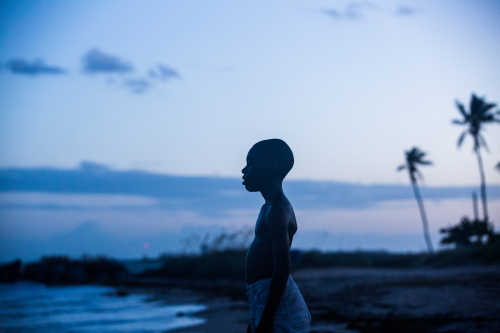
David Bornfriend/A24
MOVIE REVIEW
Moonlight (2016)
"Moonlight" depicts the coming-of-age of a gay black man in three chapters, each taking its heading from the moniker he goes by during that distinct phase in his life and representing a corresponding metamorphosis.
Prepubescent Little (Alex Hibbert), beset by bullies, temporarily takes refuge in a crack house, where he meets drug dealer Juan (Mahershala Ali). Little refuses to talk, but reluctantly agrees to let Juan treat him to a meal. Still unable to pry a name or an address from Little, Juan drives home hoping that his girlfriend, Teresa (Janelle Monáe), will help the boy open up. Little simply does not want to go home, so the couple put him up for the night. They wind up as Little's surrogate parents, as his single mother, Paula (Naomie Harris), develops a drug addiction.
The bullying escalates during Little's teenage years, when he goes by his given name, Chiron (Ashton Sanders). The schoolyard torment is a familiar narrative that will surely resonate with many. But what's truly extraordinary about "Moonlight" is something that might not be so readily or universally picked up: the sense of alienation that the film so precisely elicits.
Little is a stranger at home and at school. He doesn't feel that he belongs or that anyone has understood him. Even as Chiron, a rite of passage like losing one's virginity is awkward and unromantic.
Although he doesn't want to be someone else per se, Little does gravitate toward Teresa and Juan for the nurture lacking in his own drug-addled mother. We get a brief glimpse of Little dancing without a care in the world in what's surely a nod at "Beau Travail." If someone would harness that talent in him, his life would turn out very differently than what we see unfold in the rest of the film. Now would be a good time to stop reading, run out to catch the first screening of the film and then resume when it's over.
Whether Little or Chiron, our protagonist never really finds his place in the world. In order to assimilate, he allows the world to eat at his soul until there's none left. By the time the film reaches its final chapter, Black (Trevante Rhodes) has become someone unrecognizable from Little and Chiron. With the symmetry of a Greek tragedy, Black has become a successful drug dealer who intimidates his own underling.
In the most tender moments of "Moonlight," Black recalls what it's like to be human when he reconnects with someone from his past who reminds him of his true self before this cruel world changed him.
"Moonlight" doesn’t afford its female characters the complexity of their male counterparts, which is a shame since Ms. Harris and Ms. Monáe exhibit great potential.
It's possible to appreciate "Moonlight" purely on an intellectual level. But if you happen to be gay — and especially a gay person of color — you will know exactly what a truly monumental achievement this film is.
Comments